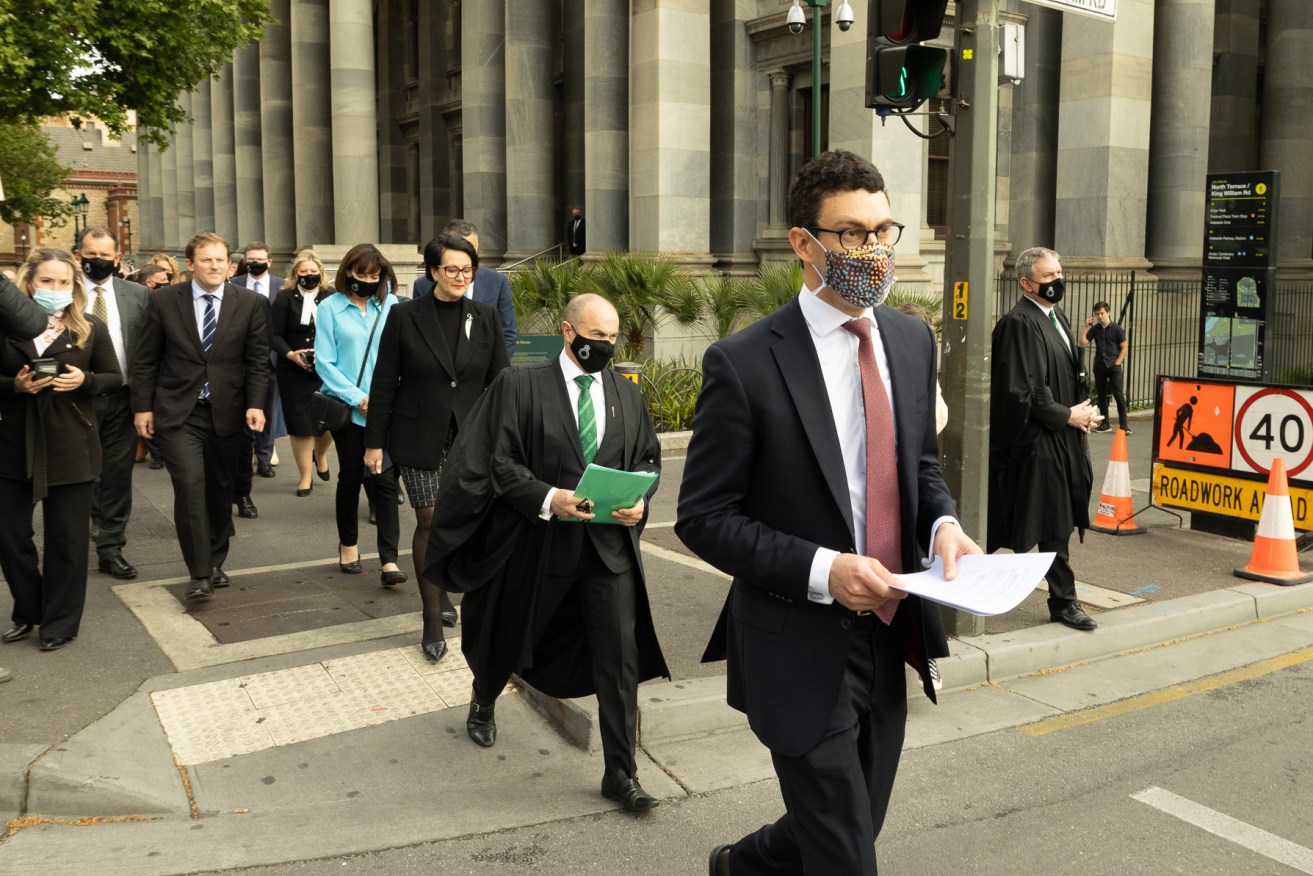Four ways to rebuild trust in our chaotic state parliament
From harassment allegations to neutering ICAC, to lightning law changes and a midnight coup, state parliament is displaying an increasing disconnect with the public. Sarah Moulds suggests how trust can be restored.

Liberal turned Independent MP Dan Cregan on his way to Government House to be sworn in as new Speaker after Liberal Speaker Josh Teague was deposed in a midnight coup this week. Photo: Tony Lewis/InDaily
The dramatic events unfolding in and around the South Australian Parliament last week – that saw a Speaker deposed, procedures and conventions radically altered and revelations about aspects of the pandemic response – underscore the urgent need to rebuild trust in South Australia’s parliamentary democracy.
This urgency has been building for some time, with pre-existing concerns about the integrity of parliamentarians, the continued legitimacy of extraordinary delegation of lawmaking power, and the absence of respect for rule of law standards.
Given the lack of structural safeguards within the South Australian Parliament to protect against rushed legislation or inappropriate delegations of power, it is not surprising that some of these problems have occurred. The people feel disconnected with those that are supposed to represent them. It is increasingly difficult to understand who is making the law, what the law actually is, and who is responsible for making sure everyone sticks to the rules.
It is easy to feel like these problems are intractable and unavoidable in the context of the COVID-19 pandemic, but there at four practical things we could do right now to begin to restore this breach of trust and to highlight those many parliamentarians who act with integrity and listen to their electorate.
As a first priority we must introduce a Code of Conduct for South Australian Parliamentarians to safeguard against sexual misconduct, bullying, corruption and to restore a culture of integrity and service with the Parliament.
This would set out in very clear terms that we expect our representatives to adhere to the same standards as the rest of us when it comes to treating others with respect and ensure everyone is safe at work. Pretty simple stuff, and the hard work has already been done by the South Australian Equal Opportunity Commissioner. This should be a matter of priority for the Marshall Government and the South Australian Parliament in the next sitting period.
Second, we should increase the resourcing and broaden the mandate of the South Australian Ombudsman and the Auditor General to undertaken independent scrutiny of South Australia’s response to the COVID-19 pandemic, including the full range of Declarations made under the Emergency Management Act 2004 (SA).
These statutory officers are currently doing much of the heavy lifting when it comes to investigating the effectiveness and fairness of South Australia’s response to the pandemic, including revealing important information about the privacy impacts of the QR Check-in Code scheme and human rights concerns about the conditions in SA medi-hotels, but their capacity is stretched and their references limited.
Investing in this oversight work is vital to preserving the sometimes fragile trust the South Australian community has placed in senior police officers and health officials to exercise their extraordinary powers to protect us.
It is increasingly difficult to understand who is making the law, what the law actually is, and who is responsible for making sure everyone sticks to the rules.
Third, we should make some structural changes within the Parliament itself to help put a break on lightening speed legislating, particularly when significant new rights-impacting laws are rushed through Parliament without any careful consideration of their broader impacts on the community, or any unintended consequences.
The shock passage of legislation amending the Independent Commission Against Corruption is one of a series of recent examples of laws being passed within hours, without the public having the opportunity to understand or even see the nature of the amendments, the rationale for the amendments or their potential impact before it’s too late.
We could do this by adopting the unanimous recommendations of a multi-party Select Committee and establish a Scrutiny of Bills and Delegated Legislation Committee to undertake scrutiny of proposed legislation having regard to matters such as: whether the bill is sufficiently clear and proportionate in its impacts; whether the bill unduly trespasses on rights and liberties and whether any delegation of legislative powers is appropriate. Through the preparation of short reports about these aspects of the proposed new law, the Parliament and the public would have a reliable, accessible description of what the law is actually all about before it is passed.
Finally, it’ time to have a bigger picture conversation with the South Australian people about our future, and our values. So many of us, our young people included, are feeling disillusioned and disconnected from the public institutions designed to help us fulfill our social contract with our State and each other.
We could help rejuvenate social contract but starting a discussion about a human rights framework for South Australia, which could include a statement of rights or responsibilities that unite us and outline creative and practical ways to help promote and protect those rights. This is the vision of the members of the Rights Resource Network SA who recently wrote to all South Australian Members of Parliament inviting them to participate in this type of conversation on International Human Rights Day this year. The forum will be open to all interested South Australians, who can nominate as a delegate here.
Dr Sarah Moulds is Senior Lecturer in Law, Justice and Society, University of South Australia and Director, Rights Resource Network SA.




